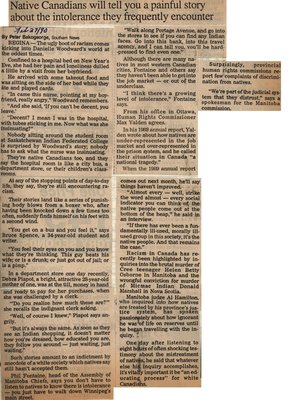"Native Canadians Will Tell You a Painful Story About the Intolerance They Frequently Encounter"
- Full Text
- Native Canadians will tell you a painful story about the intolerance they frequently encounterBy Peter Bakogeorge, Southam News
REGINA - The ugly boot of racism comes kicking into Danielle Woodward's world at the oddest times.
Confined to a hospital bed on New Year's Eve, she had her pain and loneliness dulled a little by a visit from her boyfriend.
He arrived with some takeout food and was sitting on the side of her bed while they ate and played cards.
"In came this nurse, pointing at my boyfriend, really angry," Woodward remembers.
"And she said, 'If you can't be decent, you leave.'
"Decent? I mean I was in the hospital, with tubes sticking in me. Now what was she insinuating?"
Nobody sitting around the student room at Saskatchewan Indian Federated College is surprised by Woodward's story; nobody has to ask what the nurse was insinuating.
They're native Canadians too, and they say the hospital room is like a city bus, a department store, or their children's classrooms.
At any of the stopping points of day-to-day life, they say, they're still encountering racism.
Their stories land like a series of punishing body blows from a boxer who, after having been knocked down a few times too often, suddenly finds himself on his feet with a second wind.
"You get on a bus and you feel it," says Bruce Spence, a 34-year-old student and writer.
"You feel their eyes on you and you know what they're thinking. This guy beats his wife; or is a drunk; or just got out of jail; or is a pimp."
In a department store one day recently, Debra Piapot, a bright, attractive 28-year-old mother of one, was at the till, money in hand and ready to pay for her purchases, when she was challenged by a clerk.
'"Do you realize how much these are?"' she recalls the indignant clerk asking.
"Well, of course I knew," Piapot says angrily.
"But it's always the same. As soon as they see an Indian shopping, it doesn't matter how you're dressed, how educated you are, they follow you around - just waiting, just waiting."
Such stories amount to an indictment by anecdote of a white society which natives say still hasn't accepted them.
Phil Fontaine, head of the Assembly of Manitoba Chiefs, says you don't have to listen to natives to know there is intolerance - you just have to walk down Winnipeg's main street.
"Walk along Portage Avenue, and go into the stores to see if you can find any Indian faces. Go into this bank, into this travel agency, and I can tell you, you'll be hardpressed to find even one."
Although there are many natives in most western Canadian cities, Fontaine and others say they haven't been able to get into the job market - or out of the underclass.
"I think there's a growing level of intolerance," Fontaine says.
From his office in Ottawa, Human Rights Commissioner Max Yalden agrees.
In his 1988 annual report, Yalden wrote about how natives are under-represented in the job market and over-represented in the prison system, and he called their situation in Canada "a national tragedy."
When the 1989 annual report comes out next month, he'll say things haven't improved.
"Almost every - well, strike the word almost - every social indicator you can think of, the native people come out at the bottom of the heap," he said in an interview.
"If there has ever been a fundamentally ill-used, morally ill-used group in this society, it's the native people. And that remains the case."
Racism in Canada has recently been highlighted by inquiries into the brutal murder of Cree teenager Helen Betty Osborne in Manitoba and the wrongful conviction for murder of Micmac Indian Donald Marshall in Nova Scotia.
Manitoba judge Al Hamilton, who inquired into how natives are treated by his province's justice system, has spoken passionately about how ignorant he was of life on reserves until he began travelling with the inquiry.
One day after listening to eight hours of often shocking testimony about the mistreatment of natives, he said that whatever else his inquiry accomplishes, it's vitally important it be "an educating process" for white Canadians.
Surprisingly, provincial human rights commissions report few complaints of discrimination from natives.
"We're part of the judicial system that they distrust," says a spokesman for the Manitoba commission.
- Creator
- Bakogeorge, Peter, Author
- Media Type
- Newspaper
- Item Types
- Articles
- Clippings
- Description
- "The ugly boot of racism comes kicking into Danielle Woodward's world at the oddest times. Confined to a hospital bed on New Year's Eve, she had her pain and loneliness dulled a little by a visit from her boyfriend."
- Date of Original
- Winter 1990
- Subject(s)
- Personal Name(s)
- Woodward, Danielle ; Spence, Bruce ; Piapot, Debra ; Fontaine, Phil ; Yalden, Max ; Osborne, Helen Betty ; Hamilton, Al ; Marshall, Donald.
- Corporate Name(s)
- Assembly of Manitoba Chiefs
- Local identifier
- SNPL002746v00d
- Collection
- Scrapbook #2
- Language of Item
- English
- Creative Commons licence
 [more details]
[more details]- Copyright Statement
- Public domain: Copyright has expired according to Canadian law. No restrictions on use.
- Copyright Date
- 1990
- Copyright Holder
- Southam News
- Contact
- Six Nations Public LibraryEmail:info@snpl.ca
Website:
Agency street/mail address:1679 Chiefswood Rd
PO Box 149
Ohsweken, ON N0A 1M0
519-445-2954



